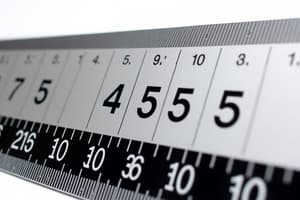Podcast
Questions and Answers
Why does the metric system continue to be used alongside non-metric systems in some countries?
Why does the metric system continue to be used alongside non-metric systems in some countries?
Some countries still use non-metric systems like the British system for certain measurements, such as pints for beer, miles for road distances, and pounds for body weight, even though the metric system is widely used and recommended for international standardization.
What are the seven base quantities recommended by the International Standards Organization for the International System of Quantities (ISQ)?
What are the seven base quantities recommended by the International Standards Organization for the International System of Quantities (ISQ)?
The International Standards Organization recommends using seven base quantities in the International System of Quantities (ISQ).
How does the vastness of the universe and the breadth of phenomena studied by physicists affect the range of units used in physics?
How does the vastness of the universe and the breadth of phenomena studied by physicists affect the range of units used in physics?
Physics encompasses a wide range of physical phenomena, which require different units for measurement. Table 1.3 lists known lengths, masses, and time measurements to demonstrate the vastness of the universe and the breadth of phenomena studied by physicists.
Explain the role of the International System of Units (SI) in enabling meaningful comparisons of physical quantities across different scales and phenomena.
Explain the role of the International System of Units (SI) in enabling meaningful comparisons of physical quantities across different scales and phenomena.
Why are units and measurement considered crucial aspects of physics?
Why are units and measurement considered crucial aspects of physics?
What is the purpose of using standardized units in physics?
What is the purpose of using standardized units in physics?
Explain the difference between base units and derived units in the SI system.
Explain the difference between base units and derived units in the SI system.
Why is it important to use the correct units when performing calculations in physics?
Why is it important to use the correct units when performing calculations in physics?
Describe the role of measurement instruments in physics.
Describe the role of measurement instruments in physics.
How do the seven fundamental units of the SI system relate to the measurement of different physical quantities?
How do the seven fundamental units of the SI system relate to the measurement of different physical quantities?
Study Notes
Physics: Units and Measurement
Introduction
Physics is a science that seeks to understand the behavior of matter and energy in the universe. One of the key aspects of physics is the measurement and expression of physical quantities in terms of units. In the field of physics, measurements are made using various instruments like balances, rulers, clocks, and others. These measurements are then expressed in terms of units, which are standardized values that allow for meaningful comparisons among different physical quantities.
In any system of units, some physical quantities must be defined through a measurement process. These are called base quantities, and their units are the system's base units. All other physical quantities can then be expressed as algebraic combinations of these base quantities.
SI Units: Fundamental and Derived Units
The International System of Units (SI) is a standardized set of units used in physics and science to express various physical quantities. The seven fundamental units in the SI include:
- Length: meter (m)
- Mass: kilogram (kg)
- Time: second (s)
- Electric current: ampere (A)
- Temperature: kelvin (K)
- Amount of substance: mole (mol)
- Luminous intensity: candela (cd)
Derived units are physical quantities that can be expressed as algebraic combinations of base units. For example, velocity would be a derived unit because it can be calculated by dividing distance (length) by time.
Teacher Support
While the metric system is widely used and recommended for international standardization, some countries still use non-metric systems like the British system for certain measurements. These include pints for measuring beer, miles for road distances, and pounds for body weight. The International Standards Organization recommends using seven base quantities in the International System of Quantities (ISQ).
Known Ranges of Length, Mass, and Time
Physics encompasses a wide range of physical phenomena, which require different units for measurement. For example, Table 1.3 lists known lengths, masses, and time measurements to demonstrate the vastness of the universe and the breadth of phenomena studied by physicists.
In summary, units and measurement are crucial aspects of physics that allow scientists to express and compare physical quantities. The International System of Units (SI) provides standardized base and derived units for various physical quantities, enabling meaningful comparisons across different scales and phenomena.
Studying That Suits You
Use AI to generate personalized quizzes and flashcards to suit your learning preferences.
Description
Test your knowledge about units and measurement in physics, including fundamental and derived units, base quantities, and the International System of Units (SI). Understand the importance of standardized units for expressing and comparing physical quantities across different scales and phenomena.




